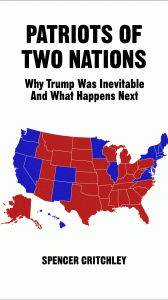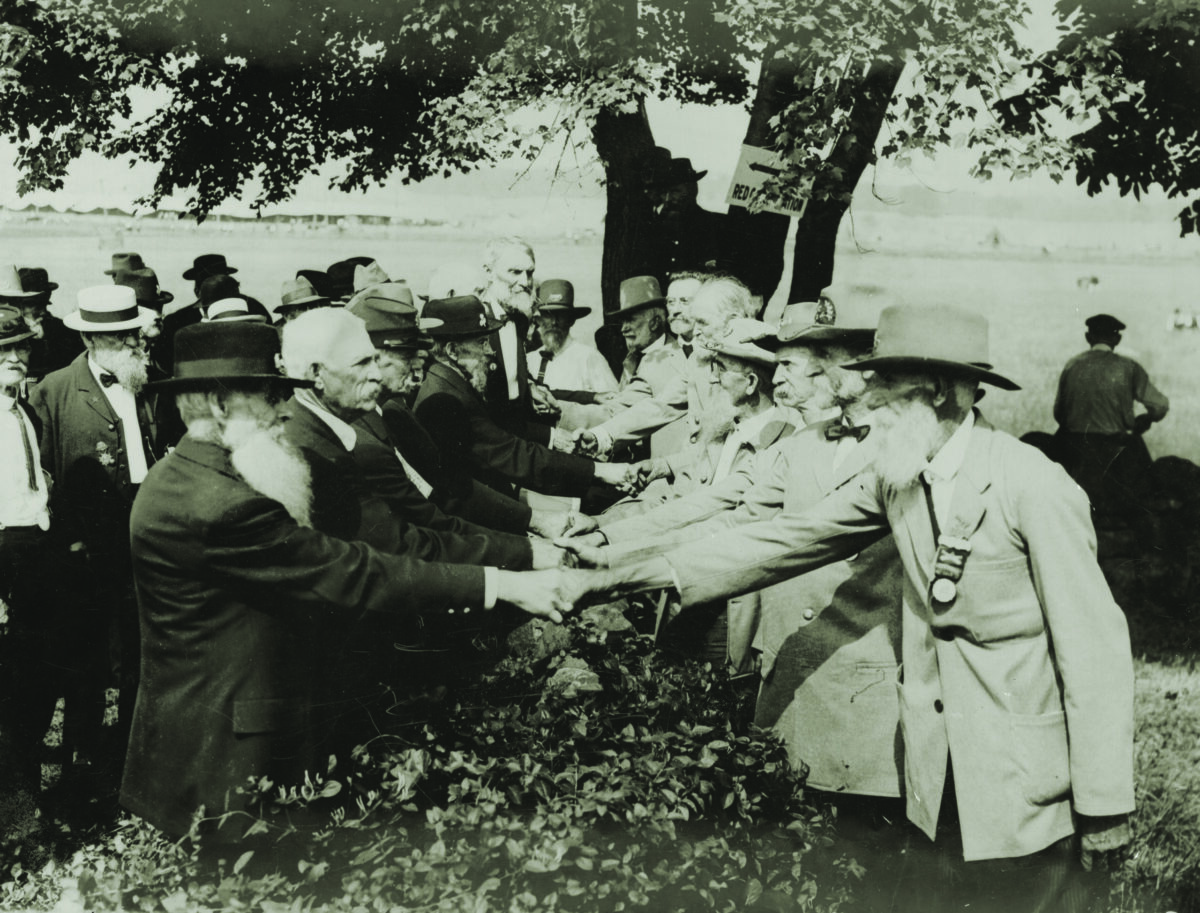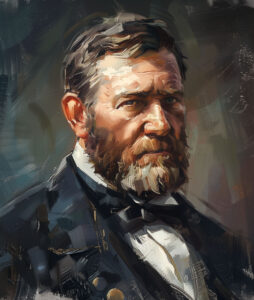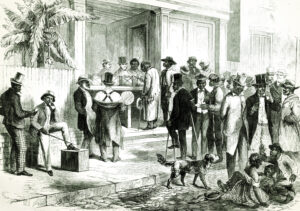Besides working on Barack Obama’s presidential campaigns, communications consultant Spencer Critchley of Boots Road Group counts the U.S. Department of Labor and others as clients. He contributes to national media outlets. His book Patriots of Two Nations: Why Trump was Inevitable and What Happens Next was published this year by McDavid Media.
You say America’s political divide is about two groups who differ greatly in their thinking—a gap you trace to the Enlightenment and Counter-Enlightenment. The Founders thought they had created a new kind of nation based on Enlightenment reason—the civic nation. But there has always been a Counter-Enlightenment resistance, fighting for faith, tradition, culture, and ties to the land—the ethnic nation. The two nations live within different world views, with different ways of thinking and even different ways of defining truth. When people say it’s as if the two sides are in different realities, they’re right. For example, when President Trump says something that is factually untrue, to his supporters that remark may sound like a higher truth, one that makes mere facts seem small.

Why, for centuries, have theologians, artists, monarchists, traditionalists, philosophers, and others recoiled against reason? Some saw the triumph of reason as a threat to their power, whose source was claimed to be God. But serious thinkers also believed reason, on its own, to be soullessly reductive. Italian political philosopher Giambattista Vico argued that science could tell you only about what was scientific, saying nothing about what mattered more: meaning. The Romantics were Counter-Enlightenment thinkers as well. They believed a world ruled only by reason would be unnatural and immoral.
America was founded on rational Enlightenment philosophy, but from the very start Counter-Enlightenment opposition was evident, including Thomas Jefferson’s. How so? Two of the most important manifestations were in religion versus science and the South versus the North. Jefferson saw freedom as “the firstborn daughter of science,” but the Pilgrims saw America as God’s City on a Hill. These views coexist in tension to this day. Meanwhile, the South-North conflict, which also persists, can be seen as the Counter-Enlightenment vs. the Enlightenment: rural, traditional ethnic nationalists vs. urban, progress-oriented civic nationalists. That conflict existed within Jefferson as well: this Enlightenment rationalist was also a slave owner who believed an agrarian society was a more virtuous one.
What are examples of America’s Counter-Enlightenment history? Among others I highlight the religious Great Awakenings, slavery and other identity-driven institutions, Andrew Jackson’s ethnic nationalism, Manifest Destiny, the Civil War; American Romanticism and Transcendentalism, the Scopes “monkey trial,” the tribalism of the 1960s counterculture and the “traditional values” reaction to it, the Tea Party revolt against globalism, and the presidency of Donald Trump or someone like him, which I see as having been inevitable, given our history.
To Counter-Enlightenment thinkers, the idea of a shared culture is paramount—and they fear its loss. Is that fear valid? The Counter-Enlightenment belief in ethnic identity mixes race and culture in varying shades. At one end of the spectrum are those with an irrational belief in the superiority of the White “race,” even though race is not a scientific concept. At the other end are people who aren’t racists, but who fear that multiculturalism will dissolve their own culture into a denatured globalism, as if we were all to replace the beauties of our native tongues with Esperanto. Enlightenment people tend to underestimate the power of culture, possibly because they don’t see past the looming ugliness of racism, or because they themselves are thriving under globalism, and so it’s easier for them to welcome it without fear.

By Spencer Critchley
McDavid Media, 2020, $8.85 (Paperback)
Does that fear explain belief in ideas or suppositions that have no basis in fact? At least sometimes, all of us find value in being non-rational. Setting aside reason can open you up to good things like creativity or love. But it can also make you vulnerable to bad things like conspiracy theories. This is especially so in the face of fear—say of economic struggles or cultural change. Demagogues exploit conspiracy theories, each stepping forward as the lone hero who can defend us from the conspirators lurking in the shadows.
What is “motivated reasoning”? How does it figure in this schism? Although we like to think our opinions are based on facts and logic, the reverse is often true: We believe what we want to believe and use reason to justify it. This seems to be an evolutionary feature of our minds, which are designed to make quick, survival-based decisions first and to think later, if ever. This feature is exacerbated by tabloid media, social media, and search algorithms, because they show us just what we want to see. Our best defense against motivated reasoning is valid reasoning—using impartially sourced facts, sound logic, and skepticism about what we want to be true.
Americans seem to have lost the willingness to compromise. What happened? Ironically, one cause was progress towards our founding vision of equality. In the early days, our new civic nationalist map happened to match an ethnic nationalist territory: we were ruled by White Anglo-Saxon Protestants. With the people running things all belonging to the same tribe, cooperation was easier. But as that changed, the map was torn apart, revealing divisions that it used to conceal. Meanwhile, technology and media helped segregate us more, into physical and online communities of people like ourselves. Many of our compatriots became strangers to us. Civil debate devolved into a tribal war of good vs. evil.
You say each side must work to connect with the other. Can it be done when the sides perceive events so differently? I’ve never before been afraid for American democracy; I am now. But I believe we can heal the divide, and each of us must help do that. Set arguments aside. Where trust is gone, no argument will win, but where trust exists, arguments are the healthy essence of democracy—an eternal debate over how to achieve good in an imperfect world. Imagine how that world can look fundamentally different to someone, how a belief that makes no sense to you can look exactly right to that person. Then find shared values. They exist behind almost any disagreement—whether we are for or against abortion rights, for example, all of us agree children are precious. Shared values build trust. As we restore trust, we can move from hate to debate. It’s up to us, not just to politicians. Democracy, after all, means rule by the people.
This interview appeared in the February 2021 issue of American History.





